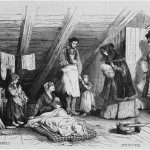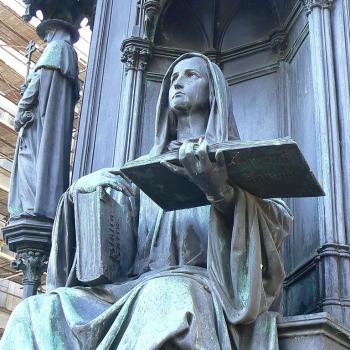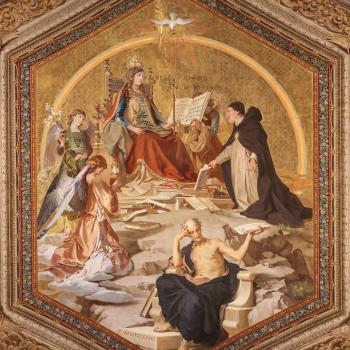![Head of Virgin Mary By Римский мастер первой половины XIII века [Public domain], via Wikimedia Commons](https://wp-media.patheos.com/blogs/sites/637/2016/04/Head_of_Virgin_Mary_from_Old_Saint_Peters_Basilica_13th_c._Pushkin_museum-2-264x300.jpg)
By Римский мастер первой половины XIII века [Public domain], via Wikimedia Commons
And yet, some could ask, if all that we have said is true, if Mary has been given a special place in salvation history, and we should honor her as our spiritual mother, why do we not find more indications of this in the Gospels? Or, more importantly, why does Jesus seem to be indifferent to his mother and her wishes in at least three different occasions in the Gospel narratives? Are we making more out of Mary and her place in salvation history than God intended?
The first occasion which some people bring up and use to question the honor Mary is to be given comes from the time when Jesus was twelve and found at the Temple. It seems that every year, during the Passover Feast, Jesus and his extended family would go to Jerusalem to celebrate the festival. That year, once the feast was over, his family left the city to go home. Joseph and Mary thought Jesus had left with them, probably with the belief he was being watched over by someone else in the family. When Mary and Joseph realized what happened, they returned to Jerusalem, looking for him and eventually finding him at the Temple. They questioned him as to what he was doing, and his response some think indicate that he had little to no regard for his earthly parents:
And when they saw him they were astonished; and his mother said to him, “Son, why have you treated us so? Behold, your father and I have been looking for you anxiously.” And he said to them, “How is it that you sought me? Did you not know that I must be in my Father’s house?” And they did not understand the saying which he spoke to them (Lk 2:48 – 50 RSV).
The next incident which is brought up is the Wedding in Cana. Here, some suggest Jesus showed disregard for his mother by the way he addresses her: not as mother, but as “woman”:
Jesus also was invited to the marriage, with his disciples. When the wine failed, the mother of Jesus said to him, “They have no wine.” And Jesus said to her, “O woman, what have you to do with me? My hour has not yet come.” His mother said to the servants, “Do whatever he tells you” (John 2:2-5 RSV).
Finally, in words which appear to reject all familial relationships, Jesus seems to redefine his family, and in doing so, undermines his mother’s significance:
While he was still speaking to the people, behold, his mother and his brothers stood outside, asking to speak to him. But he replied to the man who told him, “Who is my mother, and who are my brothers?” And stretching out his hand toward his disciples, he said, “Here are my mother and my brothers! For whoever does the will of my Father in heaven is my brother, and sister, and mother” (Matt. 12:46 -50 RSV).
The true meaning of these verses, filled with the paradoxical wisdom Christ typically used to teach his disciples, is missed when the texts are read with the agenda to use them as an excuse to ignore Mary’s honored place in the Christian faith.[1] The words certainly were written down and placed in the Gospels to teach us something, but as with all Scripture, we must be careful when reading them, because the meaning of a particular text tends to require much work to properly understand. It is easy to do a simple cursory reading and take the most simplistic, most “literal,” interpretation out of that reading and think such an interpretation is what God intended. This is what most of us do when we first read Scripture. But the more we work with Scripture, the more we read it, the more we see Scripture was not intended to be read in this fashion – for if we did, we would end up believing several contradictory things at once.[2] What matters is not the letter, but the spirit, the message of the text.
The Gospel writers certainly were able to speak to their own particular audience in a way which their contemporaries could more readily understand the point than we do today. This is because when we read the texts centuries later, we can easily read them without understanding all the nuances of the text, and the way certain words could and were used differently from the way we would use them. We want to read them with the way we would use the words today, and if we find Jesus does not do so, if we are not careful, we will end up thinking this was because Jesus was being controversial, when in reality, he was not (or, likewise, the reverse, and miss when he was being controversial). We must not, therefore, expect Jesus to follow the same customs as our society, and think if and when he does not, he was being intentionally counter-cultural. This is why we must be especially careful when reading these three texts.
We should not read the first as giving any kind of indication that Jesus was showing disrespect to his earthly parents. To read into his actions such a disregard for them is to say Jesus did not fulfill the Mosaic Law, which would contradict Jesus’ own words where he said he came not to repudiate the Law but to fulfill it (cf. Matt. 5:17). The Mosaic Law was clear: he was to honor his mother and father (cf. Ex. 20:12). If we interpret his actions as someone dishonoring them, he would have sinned, which of course, he never did (cf. 2Cor. 5:21).
Then, how exactly, are we to understand the point of Jesus’ words? Jesus was the son of Mary. But he was also the legal son of Joseph, that is, Joseph had become his legal guardian, and so represented his father on earth. But Jesus was also the Son of God, the Son of the Father. As such, Jesus fulfilled the law, not only by showing respect to his earthly parents, but also by giving God the Father his proper due. The honor and respect he gave to his earthly parents was what was proper to them. We can say that he gave to them a relative level of veneration or honor, relative to the glory which God had given to them, so that Mary, being the Mother of God, had a higher form of veneration due to her than Joseph, but even it was not absolute. Only God, God the Father, was to be honored with an absolute form of worship. To fulfill the Mosaic Law, Jesus had to respect both parties, his earthly parents and his heavenly Father, but between his earthly parents and God the Father, the kind of honor he gave to his parents, even to Mary his mother, paled in comparison to the glory and honor he gave to God the Father. And Joseph was also honored, for he had been given a special role, a unique role, in that he was to be the earthly reflection of divine fatherhood for Jesus (which, as Sergius Bulgakov explained, is why it was appropriate for Joseph to have been a real father with children in a previous marriage).[3]
Therefore, at the Temple, Jesus was giving us an indication of his two natures, with a special emphasis on the fact that he was the Son of God. He was, in this fashion, affirming familial relationships by honoring God the Father. Having achieved that aim, he returned home with Mary and Joseph, his mother and step-father, affirming his proper respect for them as well. Nothing in it indicated any disrespect for Mary or her position in salvation history, but rather, we find the reverse to be true, because he certainly followed after her, respecting her earthly authority as his mother, after she found him in the Temple.
The next text which we brought up was from the Wedding at Cana. How are we to understand Jesus’s reaction to Mary? If she is to be treated as his mother, and respected by him because she was his mother, why does he seem not to show her any respect, and merely refers to her as “woman”? There are many answers which can be given to this question; two complementary ones stand out as important to our discussion here.
The first is to understand that the title, woman, was used as a sign of respect, not disrespect; the connotations of its use in Jesus’ time differs from the social mores expected from us using modern English. While we might think it rude for someone to say to their mother, “Woman, why do you ask that of me?” the word which Jesus used, γύναι, can be translated in a more respectful tone (the word does not necessarily have to be translated as woman) to indicate more the connotation of the time. Thus, we could see he was saying “Lady,” or even “Ma’am,” the latter of which many use, respectfully, to address their mothers when their mothers are asking them to do something.
But there is another, deeper, more theological answer as to why the “woman” was used. We must remember that Jesus asked Mary why she was so concerned, that is, why the lack of wine concern both of them together.[4] Jesus was responding to Mary in a way to suggest that Mary’s concerns were his concerns, that her life and mission and his were intertwined together. His use of the word, woman, was used to reinforce this, and not to show her any disrespect. She is called woman, because he is later to be seen and called simply man, that is, he is the new or second Adam (cf. Rom. 5:12-21; 1Cor. 15:45). He is the new man and he has designated her and declared her to be the woman who works in and with him, the new or second Eve. He is man and she is woman! At the expulsion of the first Adam and Eve from the Garden of Eden, God prophetically stated that the woman, that is the New Woman, the New Eve, would squash the head of the serpent (Gen. 3:15). The concern of Jesus is the salvation of the world, but that salvation is accomplished with his New Eve, Mary, as the prophecy indicated. Jesus was asking Mary what her desire had to do with their mutual mission, the salvation of the world, affirming her place in salvation history as not just any woman, but the woman, the second Eve who has her place beside him.
More to Come
[1] If we wanted, we could find other examples of where it seems Jesus undermined the value of family relationships, such as when he said:
“For I have come to set a man against his father, and a daughter against her mother, and a daughter-in-law against her mother-in-law; and a man’s foes will be those of his own household. He who loves father or mother more than me is not worthy of me; and he who loves son or daughter more than me is not worthy of me” (Matt. 10:35-7).
At first glance, this seems to be a very harsh declaration, but the more we examine it and its meaning, the more we know Jesus was not telling his disciples to deny the value of their families, but to deny making their family an idol by putting it in front of them as a way to interfere with following Christ. If any of his disciples found the demands placed upon them by their families interfered with their following of Christ, such as if their families told them to deny Christ, they were to follow Christ over their families. We find this is exactly what many early martyrs, especially virgin martyrs, did. Nonetheless, Jesus did not deny the relative respect that people were to have for their families. He, after all, could be seen working with families, promoting marriage such as at the Wedding of Cana, helping parents heal their children, children their parents, and also in and through the way he gave positive representations of families in his parables, such as we find with the parable of the prodigal son. If he repudiated family life altogether, he would have not done or said anything to encourage family life itself. What he said, therefore, was merely a reminder of the limit of the value of family. To love and obey God is the first of all commandments, and if any other obligation sought to undermine that love, such secondary obligations could therefore be dispensed.
[2] For example, we would believe God does not change (cf. Mal. 3:6) and yet changed his mind (cf. Ex. 32:14). Since the literal interpretation of both propositions cannot both be true, we must discern the true meaning behind them so that they can be harmonized together. The solution here is to understand, as we have discussed before, why God appears to change in our relationship with him is because we encounter him in time, but for God, all of he does is of his own, perfect, eternal act.
[3] We will discuss Marys’ perpetual virginity and with it, the realization that Jesus’ “brothers” and “sisters” could be, and should be, seen as the children of Joseph later. Nonetheless, the point that Joseph is best seen as having children of his own is stated quite well in Bulgakov’s work, The Friend of the Bridegroom. See Sergius Bulgakov, The Friend of the Bridegroom. trans. Boris Jakim (Grand Rapids, MI: William B Eerdman’s Publishing Company, 2003), 177- 188 for Bulgakov’s perspective on Joseph and his relationship to, and difference from, John the Baptist, including Bulgakov’s criticism of some Catholics who want Joseph to be a virgin like Mary.
[4] That he was to perform the miracle shows that there was a legitimate concern, which the church interprets eucharistically: the transformation from water to wine demonstrates Jesus’ power to change the very substance of what was before him; but more importantly, the wine is significant, because wine is used as an image of his blood, and so this event, with its use of wine, suggests that his own wedding feast will be established by the shedding of his blood and his ability to keep on giving it to us and having it not run out.
Stay in touch! Like A Little Bit of Nothing on Facebook:
A Little Bit of Nothing













